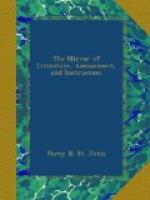The fair lady looks out from her lattice,
but now
Her eye is as bright as her fair shining
brow:
And is sorrow so fleeting?—Love’s
tears—dry they fast?
The stronger is love, is’t the less
sure to last?
Whose arm sees her knight round her waist?—’Tis
his own;
By the battle she wept for, her lover
is won;
“Ply the distaff, my maids, ply
the distaff no more;
Would you spin when already he stands
at the door?”
Monthly Magazine.
* * * * *
[Illustration]
LORD CORNWALLIS’S MONUMENT, IN INDIA.
The annexed cut represents the mausoleum of the Marquess of Cornwallis, whose distinguished connexion with the success of British arms in India will be recollected by the reader. It stands at Ghazepoor, a large town or city, in the province of Benares, on the river Ganges, about 450 miles from Calcutta. His lordship died on the river in the year 1805, while proceeding to make the requisite arrangements for some ceded prisoners. He was, at the time, governor-general of India, having been appointed to succeed the Marquess Wellesley, in 1804. The last act of his life accords with his general activity and vigilance, for he always gave his instructions in person, and attended to the performance of them. His personal character was amiable and unassuming, and if his talents were not brilliant, his sound sense, aided by his laudable ambition and perseverance, effected much good.
The monument is built of stone, and cost a lac of rupees, or 10,000_l_. It is surrounded by an iron railing, and its vicinity is the favourite promenade of the gentry of Ghazepoor, which has been termed the Montpellier of India.
Bishop Heber, in his interesting Journey through India, objects to the architectural taste of the monument in these critical observations:
“During our drive this evening I had a nearer view of Lord Cornwallis’s monument, which certainly does not improve on close inspection; it has been evidently a very costly building; its materials are excellent, being some of the finest free-stone I ever saw, and it is an imitation of the celebrated Sibyl’s temple, of large proportions, solid masonry, and raised above the ground on a lofty and striking basement. But its pillars, instead of beautiful Corinthian well-fluted, are of the meanest Doric. They are quite too slender for their height, and for the heavy entablature and cornice which rest on them. The dome instead of springing from nearly the same level with the roof of the surrounding portico, is raised ten feet higher on a most ugly and unmeaning attic story, and the windows (which are quite useless) are the most extraordinary embrasures (for they resemble nothing else) that I ever saw, out of a fortress. Above all, the building is utterly unmeaning, it is neither a temple nor a tomb, neither has altar, statue, nor inscription. It is, in fact, a ‘folly’ of the same




